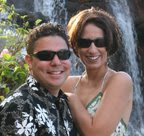Using Carol Stock Kranowitz' book, The Out-of-Sync Child as a reference, I am going to concentrate on the Vestibular Sense today.
The Vestibular System
The vestibular system sends sensory messages to our brain about balance and movement, generating muscle tone so we can move smoothly and efficiently. The receptors for vestibular sensations are hair cells in the inner ear, stimulated by gravity. It is what responds when we feel ourselves "falling"-- the response being self-protective reflexes.
Vestibular Dysfunction
Vestibular dysfunction is the inefficient processing in the brain of sensations received through the inner ear. Posture and coordination can be off. Eye movements are influenced by the vestibular system, so visual problems can occur --- inadequate gaze stability, inability to focus on moving objects, reading problems due to coordination issues with left-to-right eye movement, etc. It can contribute to difficulty processing language. Certain movements that should produce a calming effect do not for the out of sync child, causing them to be unable to calm themselves down. Difficulty moving smoothly interferes with behavior and attention.
Overresponsivity - children respond negatively to movement; causes emotional outbursts or overexcitement; can't organize sensory stimuli due to overload; some may be intolerent to any movement at all;
Gravitational Insecurity - no sense of stability; primal fear of falling - abnormal distress and anxiety about falling
Underresponsivity - this child doesn't seem to notice changes in movement; these children typically were called "easy babies"; loved curling up for long naps; later lacks any motivation to want to move; does not usually seek movement; needs extra movement just to get going, but then once started, has difficulty stopping; oblivious to the sense of falling
Seeking more - can't get enough of movement; increased tolerance for movement; enjoys vigorous activity; loves being upside-down, loves to climb - -uses everything for a ladder; loves swinging for exceptionally long times; loves twirling in circle --oftentimes seeming like they don't get dizzy; darts from one activity to another; short attention span even for things they enjoy; constantly on the go, but moves without caution or good motor coordination
Muscle Tone is the degree of tension normally present when our muscles are in the resting state. A child with a vestibular dysfunction may have low muscle tone. (this is not strength of muscles, but the state at which the muscles are at rest). Their muscles lack the energy needed to be ready to move. It takes a little bit of extra effort to just get them started.
Bilateral Coordination is a term used to describe using both sides of the body to work together. A well-regulated vestibular system helps to integrate sensory information from both sides of the body. Children by age 3 or 4 should be able to cross the mid-line, which means reaching with one hand to the other side of the body (crossing the center of one's body) -- think 'cherry-pickers' from grade school PE class (arms outstretched-twisting and bending to touch our right hand to our left foot and then back to center, reverse) or shaking hands with someone (your right hand with their right hand, crossing over your center of your body).
It's also what contributes to the ability to jump with both feet from a ledge to the ground, as opposed to just stepping off with one foot.---- or using both hands to clap.
The Vestibular Sense and John
For John, I checked 2 of the 4 listed for underresponsive in movement
and 4 of 7 in sensory seeking. I had a lot checked and a lot of question marks in the "sensory slumper with sensory-based postural disorder affecting movement of head, balance, muscle tone, and bilateral coordination".
John had lots of scattered skills throughout this section, but nothing that is definitive for me, although my gut tells me he is the sensory seeker for movement.
For example, he moves all the time and is almost always in constant movement, which would tells me that he is a sensory seeker. However, he doesn't vigorously shake his head, doesn't rock back and forth, doesn't like trampolines more than other kids (he will jump for 2 seconds and then he is done, as with everything else he does), etc. Many of the questions in the checklist were not age appropriate for me to know yet with John (like seeks out thrill rides at amusement parks).
He appears at times to be uncoordinated, but can clap, cross the mid-line, open doorknobs, is already potty trained (poor bladder control is one checkbox), and loves structured activities (hard time with structure was another check box) -- he actually loves the structure.
So, to sum it up, there seems to be an issue here for John, but I can't pin point it myself. I'll have to see what the OT evaluation shows.
Subscribe to:
Post Comments (Atom)




No comments:
Post a Comment